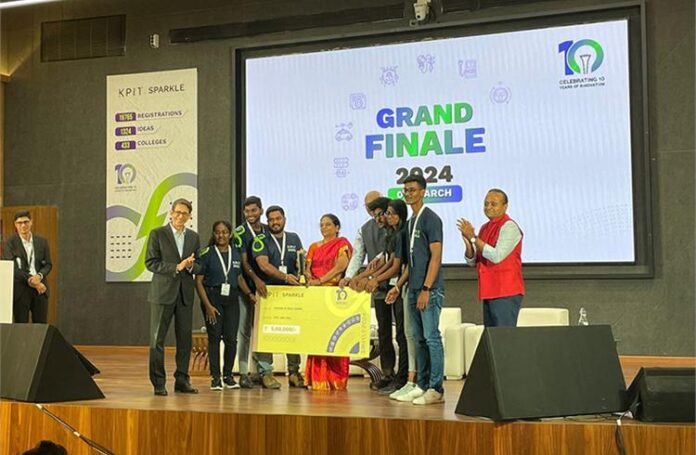KPIT Technologies (NSE: KPITTECH BSE: 542651), an independent software integration partner to the automotive and mobility ecosystem for making software-defined vehicles a reality, announced winners for its flagship mobility software design and development innovation contest, KPIT Sparkle 2024.
Over the last seven months, 1000+ ideas came from 19000+ students across 400+ colleges. After rigorous evaluation on alignment to published themes around software technology innovation for mobility by KPIT subject matter experts across two stages, eight teams made it to the finale.
Winners of KPIT Sparkle 2024
- Team G-Rex from Kongu Engineering College, Perundurai, Tamil Nadu won the Platinum Award with prize money of INR 7,00,000. Innovation – Design and development of an efficient indigenous hydroxy (HHO) gas generation system for the SI engine by dry cell electrolysis method.
- Team Krenoviantz from Sri Krishna College of Engineering and Technology, Coimbatore, won the Gold Award Name with prize money of INR 5,00,000. Innovation – Plug-in Kit for Ready Charging.
On the side-lines of KPIT Sparkle, the KPIT Shodh Awards, a global platform for PhD researchers from academia and industry, participated in the coveted awards.
Winners of KPIT Shodh Awards 2024
- Mr. Vijayakumar Kanchetla from the Indian Institute of Technology, Mumbai, won the Best Groundbreaking Research Award with prize money of INR 10,00,000. Thesis – Dhruva: A global navigation receiver chip for NavIC, GPS, Galileo, and BeiDou.
- Mr. Debattam Sarkar from Jawaharlal Nehru Centre For Advanced Scientific Research won the Best Research Award with prize money of INR 9,00,000.
Thesis – Tailoring of Chemical Bonding, Electronic Structure and Lattice Dynamics to Achieve High Thermoelectric Performance in Metal Chalcogenide.
Mr. Ravi Pandit, Chairman of KPIT Technologies, said, “KPIT Sparkle has inspired over 100,000 students throughout its 10-year journey. Our unwavering goal is to foster a culture of innovation among the brilliant young minds that will shape the future of mobility and sustainability. The shift in emphasis towards real-life challenges in mobility has been deeply beneficial and inspiring for students.”


